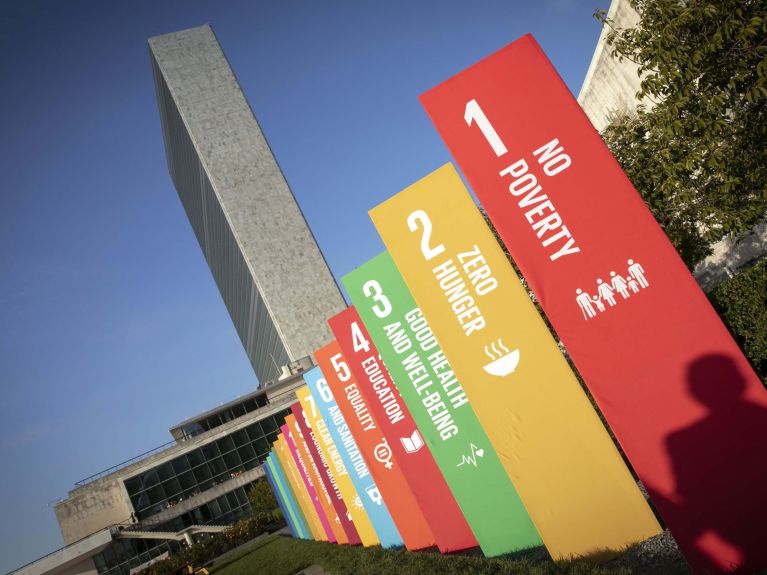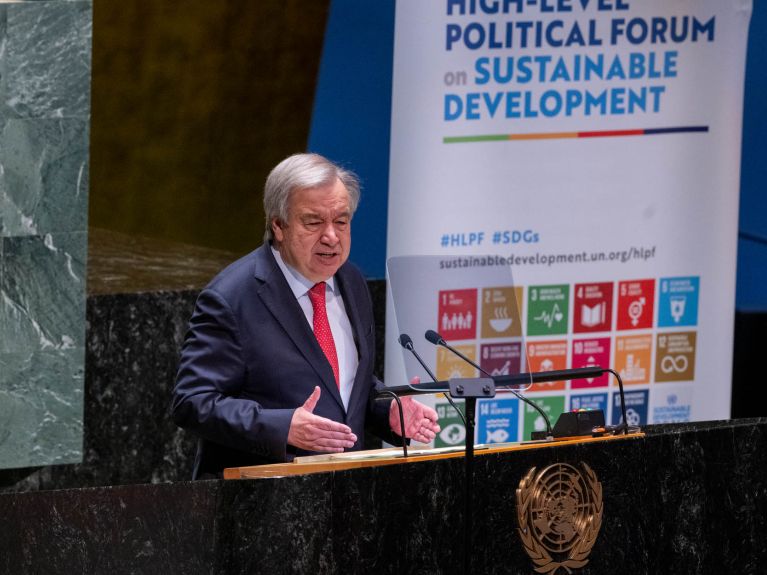Decisive action to pursue the 2030 Agenda
The mid-term review of the implementation of the global goals for sustainable development is sobering. Germany is now looking to drive forward the 2030 Agenda.

“Leave no one behind” – this was the promising slogan that accompanied the setting of the sustainable development goals (SDGs) in 2015. This was the year in which the United Nations adopted 17 goals in its 2030 Agenda that are to act as a guideline for politics, economy and society worldwide. The mid-term review in 2023 is sobering: the world is still a long way from achieving the goals. Germany’s Development Minister Svenja Schulze warns: “It’s time to act even more resolutely.”
Yet everything sounded so promising in 2015. With its Agenda 2030, the global community created a kind of recovery programme for the world. With its 17 concrete goals and 169 somewhat more specific targets, the idea was for it to be “an action plan for people, planet and prosperity”, as stated in the preamble: a formula for a transformation for the better, to which all countries of the world were to contribute. Unlike the previous Millennium Development Goals (MDGs), the SDGs now also applied to industrialised countries such as Germany. It was based on the belief that this Herculean task could only be accomplished if everyone contributed.
Dieses YouTube-Video kann in einem neuen Tab abgespielt werden
YouTube öffnenThird party content
We use YouTube to embed content that may collect data about your activity. Please review the details and accept the service to see this content.
Open consent formUN: Implementation of the 17 sustainable development goals is in danger
At the release of the SDG progress report by way of a mid-term review, UN Secretary-General António Guterres stated unequivocally that the promises of 2015 were at risk. And with regard to the 17 sustainable development goals, he added: “No country can afford to see them fail.”
According to calculations by the United Nations, more than 30 percent of the targets have seen no progress at all or the situation has even got worse. A certain amount has been achieved at the halfway point, but not enough. And for only 15 percent of the targets, the world is actually on track – too little to achieve the goals overall by 2030 if the pace remains the same.
There have been positive developments in some areas: for example, 91 percent of the world population now has access to electricity, 95 percent live within reach of mobile broadband, and there are more extensive protected areas in the ocean. And there are now more countries in which companies are required to report on environmental and social standards. Yet only one third of countries will succeed in halving the poverty rate. Based on current calculations, 575 million people will still be living in extreme poverty.
There are several reasons for this sobering outcome: global crises have set the world back on its path to greater sustainability and development. These include the COVID-19 pandemic and also the Ukraine war, which has exacerbated the global availability of food due to the lack of wheat exports from Ukraine since the Russia invasion. But efforts have also been slowed down by debt crises, poor governance and a lack of interest, as well as local conflicts in countries such as Yemen, Eritrea, Congo, Cambodia and Venezuela.

Germany announces increased commitment to Agenda 2030
In view of this, Germany is seeking to further intensify its efforts to achieve the sustainable development goals. We must “set the right course now to make rapid progress”, emphasises Bärbel Kofler, Parliamentary State Secretary at the Federal Ministry for Economic Cooperation and Development. “We’re driving structural transformation worldwide that is socially just and ecological, and we’re investing in global solidarity.”
The goals are not only a yardstick for foreign and development policy, however. Germany must work towards achieving the goals in its own backyard, too. All in all, the Federal Republic of Germany is doing well here: it ranks fourth in an international SDG ranking after the Nordic countries Finland, Sweden and Denmark. But there is a need to catch up in certain areas, such as sustainable consumption, sustainable production and climate protection.
In this connection, the Deputy Director of the German Institute of Development and Sustainability, Axel Berger, warns of “negative spillover effects” on developing countries, since the latter feel the effects of climate change more than northern industrialised countries. In addition, such countries are also more subject to the impact of “how we produce and consume”, he says, such as in the area of fundamental human rights and labour rights.
So UN Secretary-General Guterres hopes the mid-term review of the 2030 Agenda will provide fresh momentum for the sustainable development goals. Scientist Berger also calls for more funds to pursue the goals, and for effective spending, too: “The main issue now must be to align the international financial architecture in such a way that we can massively promote the transformation towards greater sustainability.”


